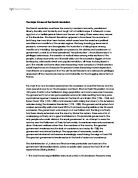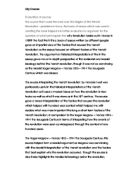How France was arranges socially
- Buying and selling of privileges
- Clergy
- Nobles
- Kingdoms lacks of uniformity obvious structure of privileges
- Burden of taxes full upon them who were least likely able to pay them
- Parlements always resisted taxation even though it was an age of inflation
Etc…
How France was arranged geographically
36 generalities etc…
Social issues
Cahiers De Doleance
I have to read that document now.
Main thing bothering the rich people was that they didn’t want to pay taxes,
Main thing bothering the poor people was that they didn’t want to have to pay tariffs and taxes and little expenditures.
The nobles wanted to still have the status that they had become accustomed to.
Introduction
The Cahiers de Doleance was the ultimate chance for the French government to gain the confidence of the people and to ease the rising tensions of each group on France. This attempt at Louis to show his increasingly disloyal subjects that he did care about their grievances and that their problems were of importance to him.
The social structure of France
France at this time was essentially divided into three estates. The first estate consisting of the clergy and the church, the second estate consisted of nobles and the third estate had the rest of the population. The division of power between these three estates was very un-balanced. The majority of power rested upon the first and second estate that made up a very small population of the country. This caused many grievances and many considered this to be highly un-just.
Why schama is incorrect in saying that the social structure of France did no cause the French revolution but social issues did.
He is correct in some sense but he is incorrect in saying that they are completely un-linked. Social issues are as a result of what the social structure implemented on to them. As a result of the un-just separation of powers, therefore there were many grievances and complaints from the third estate.
I believe that schama is in-correct in saying this. One cannot say that the two are completely un-linked and that one happened without the other, as I believe schama is saying. He is distinguishing between the two causes, structure and issues but the social issues that the people of France faced at that time were as a direct result of the social structure. The social structure of France and the way it was arranged geographically, politically and socially. As Lefebvre says “The social structure on the European continent still bore an aristocratic imprint” and these structures caused the social issues which led to such a violent outburst and what led to the French revolution.
Cahiers de Doleance: Notes
General Cahiers of the three orders convoked at Vesoul (Franche Comté)
United by the identity of interests established by the identity of interests between the three orders by the nobility and clergy’s complete and authentic surrender of all pecuniary exemptions in relation to taxes or public charges present and future, have resolved to draw up the cahier of our grievances together,
3. Preserve the personal safety and liberty of all citizens…preventing the future use of lettres de cachet.
4. Ministers not be able to hinder the exercise of the legislative power, nor infringe personal liberty or property by any arbitrary order, even if signed by the king,
5. No general law shall be reputed such in France unless it has either been proposed by the king and accepted by the estates general.
6. …It is for the Estates General themselves to determine their date of dissolution and of their assembly in the future.
10. The deputies will demand recognition of the right belonging to the nation to give its consent to taxation, to regulate the way I which it will be spent and to scrutinize the way in which it has been spent by means of annually published accounts.
12. Voting by head shall be demanded
The Cahier of the clergy of the Saints.
Judicial offices…long attracted lively criticism.
Complaints…judicial process is too slow. To expensive and too complicated.
Paris…only admitting nobles as judges…shuts the door to many honourable and capable men.
The territorial jurisdiction of Paris is too large.
The Cahier of the nobility of Bouzonville
The third estate complained of the Ségur ordinance of 1781 which restricted commissioned entry into the army to those with four generations of nobility
The profession of arms has become almost humiliating for the provisional nobility
In contempt of seniority and of the merits of the services performed by gentlemen who are poor
The military career has become a matter of money, governorships and commands
The nobility begs his majesty to leave the higher ranks open to merits
The Cahier of the third estate of Paris
3. That the odious wall, by means of which the king’s tax farmers have imprisoned the capital….be demolished from top to bottom at the expense of said tax farmers
4. King to spend his winters in the good city of Pairs
6. Diminish the terrifying proliferation of carriages
7. Build the pavements
8. No proprietor shall be allowed to build houses of more than four storeys
12. Reduce the incredible number of petty assassins who, with the aid of a wig and a license, wielding often only the razor, undertake the most complicated illnesses and whom the blood of the people seems to have been abandoned.
24. Diminish the number of free art and other schools and of scholarships to college which depopulate the countryside and workshops which are of much greater social utility than this crowd of unemployed clerks
49. Estates General regularly convoked every three years
The Cahier of the third estate of Nemours
Vingtiéme if the only rational tax…the only one…meant to be proportionate to income…this equity resides only in the word and not yet in the deed.
1750 Machault…judged that the clergy did not have a valid claim to be exemption from a tax that was to be levied onto the whole nation.
Clergy…that they only owe the state their prayers
Calonne…he did not think, even as prime minister, that he could obtain anything from his own order beyond the 900,000 for which he had thanked them. (Calculations of the assembly of the notables that if the clergy paid on the same basis as the nobility they should pay 22,000,000
Demonstrates how much the power of the King is augmented by the help of that of the nation
Certain that the state’s general would meet that the clergy declared on all sides that it would be happy to contribute not only to the Vingtiéme …but even to the replacement tax for the taille which would be assessed on all orders…renounce all fiscal privileges,
Not a single property of the nobility, the nobles de robe or even those citizens of the third estate distinguished by their wealth or by their offices which is taxed at the true rate.
Third estate cannot but observe with sadness that this state of affairs was inevitable, since all the companies and magistrates supported it with all of their power
The third estate demands the same equality…should be established between all the provinces as between all private citizens, that the abonnements of all the pays d’états and the prices should likewise disappear.
The Cahier of the Parish of Vitry-sur-Seine
- Tax band of the land at Vitry be altered.
4. The total suspension of all privilege whatsoever…these privileged men profit from the misery of the inhabitants of the parish to but up the land and houses which come on to the market by offering a price which no parishioner can give, given that he is burdened by taxes from which the privileged are exempt.
Another sort of privilege are the exemptions from parish dues…most well to do inhabitants of the parish, who to get out of paying these dues, buy an office in the town militia…with the result that none or ten of the richest…are exempt.
12. The price of bread to be fixed at a lower price…ad better quality
13. The export of grain to be absolutely forbidden.
18. Suppression of the aides: wine is a produce of the land.
The Cahiers of Les Arcs, Provence
Division between the orders, each with its rights, objectives and conflicting interests, is a great misfortune for the nation and a great obstacle to the general good.
There remains a great contention between the orders in the form of feudal rights which burden the person and the property of the third estate
The Cahier of the inhabitants of Montauroux and Les Adrets
The inhabitants protest against the Banalité- the obligation to have their produce pressed at the seigneur’s mill.
Spend four or five hours taking their olives and grain there…several people have been drowned…noted with sadness that the seigneur built two new mills but restricted their use to foreigners.
Taxation
The French peasant bore a heavy burden of taxation. He paid the tithe to the church, Vingtiéme, Taille, capitation and gabelle. These taxations were easily depriving the peasant of any chance to climb higher in the social ladder. They were an extreme burden to them and this was one of their main grievances. The fact that the poorest were being taxed the highest outraged them and in the cahiers they express their distaste with the situation and their need to change the situation. It is discussed by them that not a single person whether they be of nobility, clergy or even some of the richer third estate is paying fair and equal taxes.
Lefebvre, G. The French revolution: From its origins to 1793 P.37
The Cahier of the third estate of Nemours









